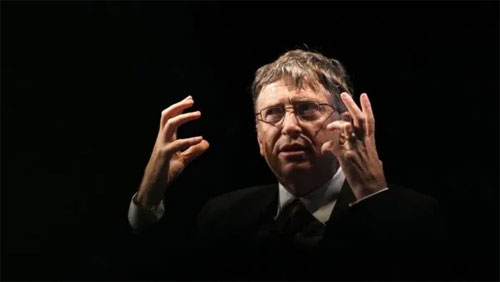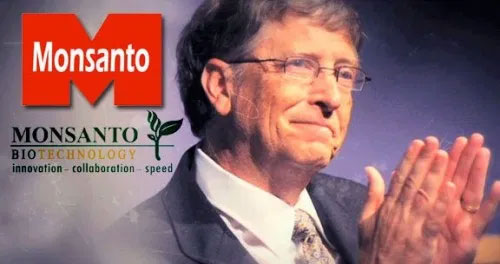Bill Gates’ Web of Dark Money and Influence – Part 1: Philanthropic Narrative Shaping
In the first few months of 2020, business tycoon and billionaire Bill Gates saw his popularity soar through the roof. According to YouGov, 58 percent of Americans polled about Gates had a positive opinion of him, he is equally liked by men and women, and both Boomers and Millennials adore him. Gates’ popularity might have increased due to a viral Netflix documentary about his life being released in late 2019. Combine that positive press with a wave of media interviews seeking the guidance of the man who “predicted” the next major pandemic, and voila – Bill Gates is a superhero here to save the planet from impending doom.

Of course, this rather cartoonish view ignores several incontrovertible facts, and a few strong theories regarding Gates’ true intentions. First, the facts. Bill Gates has used his immense wealth to garner influence and media time, spreading his message of fixing global health issues while he continues to make billions. Using the Bill and Melinda Gates Foundation to dole out grants and donations, Gates has created a web of organizations who owe their budget to the Foundation or answer directly to Gates. By tracing the Foundation’s investments and Gates’ relationships we can see that nearly every person involved in the fight against COVID-19 is tied to Gates or his Foundation by two degrees or less. This gives Bill Gates and his Foundation an unchallenged influence over the response to the pandemic. Equally worrisome is Gates’ call for global lock down until the entire world has been vaccinated and given a digital certificate to prove immunity.
Now, the theories: when taking a careful listen to several speeches and statements made by Gates, it becomes clear that he has a penchant for discussing reducing population growth. Despite “fact checkers” claiming Gates’ words have been taken out of context, his words speak for themselves. He believes the population should be reduced or prevented from growing, and he believes this can be done with vaccines and healthcare.
As we attempt to peel back the layers of PR stunts and puff pieces fawning over Bill Gates, we hope to illustrate that the man being propped up on the global stage and sold to the people as their savior, is anything but. Despite the apparent growth in support for Bill Gates, there is also evidence on social media that people are beginning to question him and challenge the savior narrative. This is the first step in unraveling Bill Gates’ Web of Dark Money and Manipulation.
The Global Influence of the Bill and Melinda Gates Foundation
In 1994, the story goes, Bill Gates asked his father, William Gates Sr., to help him “improve reproductive and child health” by founding and leading the William H. Gates Foundation. Gates Sr. agreed and by 2000, the Foundation was merged with the Gates Learning Foundation to become the Bill & Melinda Gates Foundation. According to the Foundation, Bill Gates has donated $36 billion of his personal wealth to the foundation. The Foundation is estimated to be valued at $46.8 billion.
For the last two decades the Foundation has invested in a range of controversial companies and projects while pursuing their goal of improving global health and access to vaccines and reproductive care. This has all been done as part of Gates’ plan to reshape his public image as that of a friendly and kind billionaire whose only aim is to help the world. The reality is much more suspect.
Let’s take, for example, the Netflix documentary mentioned above, Inside Bill’s Brain: Decoding Bill Gates. Rather than being a genuine look at the life and personality of Gates, the documentary failed to acknowledge conflicts of interest which might portray the film – and Bill Gates – in a different light. In a recent explosive investigation examining the reach of Gates’ money, The Nation noted that, “in the first episode, director Davis Guggenheim underlines Gates’s expansive intellect by interviewing Bernie Noe, described as a friend of Gates.” Noe goes on to tell of Gates reading 150 pages an hour with 90 percent retention. However, The Nation reported, “Guggenheim doesn’t tell audiences that Noe is the principal of Lakeside School, a private institution to which the Bill & Melinda Gates Foundation has given $80 million.” Coincidentally, this is the same school that the Gates’ children attend.
Of course, using the Foundation’s wealth to influence media coverage is not new for Bill Gates. Although The Guardian claims editorial independence, their Global Development section is funded in part by The Gates Foundation. The Foundation has also given more than $9 million to The Guardian, over $3 million to NBC Universal, over $4 million to French newspaper Le Monde, over $4.5 million to NPR, $1 million to Al-Jazeera, and $49 million to the BBC’s Media Action program. In light of these investments it’s easy to understand how Gates could quickly organize a speaking tour of his favorite media outlets.
Corporate media outlets are not the only beneficiaries of the Gates Foundation. They have also invested in controversial technologies and companies, including Monsanto, geoengineering, 5G technology, and vaccines.
MintPress News reported on how the Gates Foundation helped highly controversial pharmaceutical and chemical giant Monsanto Corporation “gain a stronger foothold in Africa.” MPN also notes that the Foundation funded a, “flawed clinical trial of the HPV vaccine in India in 2009, where 23,000 impoverished girls aged 9-15 were exposed to potentially lethal drugs without even their parents’ consent, leading to seven deaths.”

In 2010, it was also reported that since 2007, 2ates had given $4.5 million to study geoengineering methods for altering the stratosphere to reflect solar energy, techniques to filter carbon dioxide directly from the atmosphere, and brightening ocean clouds. Geoengineering is the deliberate mass scale manipulation of the weather for the stated purpose of reducing heating on the planet. The Guardian previously noted that Gates gives “an undisclosed sum” to geoengineering proponent and Harvard professor David Keith. Gates also owns majority stake in Keith’s geoengineering company, Carbon Engineering. Prominent geoengineering researcher Ken Caldeira says he receives $375,000 a year from Gates and works for Intellectual Ventures, a private geoengineering research company part-owned by Gates and run by Nathan Myhrvold, former head of technology at Microsoft.
The Foundation has also invested $10 million towards developing antennas which will accelerate the roll out of controversial 5th generation cellular technology, otherwise known as 5G.
The concerns around Bill Gates fortune and his use of the Bill and Melinda Gates Foundation to influence pet projects is not the only worry expressed by critics of the Foundation. The larger – and more immediate – is that unelected billionaires like Gates are using their fortunes to shape public policy using their philanthropic foundations. This method of investing billions of dollars in the form of tax-deductible charity donations to private companies is allowing Gates to shape policy and profit by holding stock in the same companies supported by the Gates Foundation.
An investigation by The Nation uncovered more than 19,000 charitable grants from the Gates Foundation in the last two decades. They also found $2 billion in these tax-deductible charitable donations to private companies. Companies receiving these donations include GlaxoSmithKline, Unilever, IBM, and NBC Universal Media. The Nation noted that the Gates Foundation has given $250 million to media companies and “other groups to influence the news.”
The Nation found close to $250 million in charitable grants from the Gates Foundation to companies in which the Foundation holds corporate stocks and bonds: Merck, Novartis, GlaxoSmithKline, Vodafone, Sanofi, Ericsson, LG, Medtronic, Teva, and numerous start-ups.
You might see the previous statement and ask, “how can this be legal? Is it not a conflict of interest to hold stock in a company which you also give tax-free donations?” The simple fact is there are not rules or laws against doing exactly what the Bill and Melinda Gates Foundation are doing. While some might argue that Bill Gates’ scheme is brilliant – donate your fortune by forming a foundation which can give tax-deductible donations to companies you partly own and reap profits while avoiding taxes – it is allowing him to hide his money in a myriad of ways. It has almost become impossible to track every donation, investment, or other partnership.
The Nation concluded, “It is difficult to ignore the occasions where their charitable activities seem to serve mainly private interests, including theirs—supporting the schools their children attend, the companies their foundation partly owns, and the special interest groups that defend wealthy Americans—while generating billions of dollars in tax savings.”
Other notable facts from the investigation include that the Gates Foundation’s “$50 billion endowment has generated $28.5 billion in investment income over the last five years” while only giving away $23.5 billion in charitable grants. Additionally, a 2007 LA Times investigation found that the organization was involved in subprime mortgage loans and for-profit hospitals which reportedly performed unneeded surgeries. The Gates Foundation is also reportedly invested in chocolate companies that use child labor.
It would be a mistake to see the Bill and Melinda Gates Foundation as merely a vessel for a rich man to hide his money and reap immeasurable profits. No, the Foundation is “more than a collection of grants and projects” says Dr David McCoy, a public health doctor and researcher at University College London and an advisor to the People’s Health Movement. McCoy says the Foundation “operates through an interconnected network of organizations and individuals across academia and the NGO and business sectors” which allows Bill Gates to “leverage influence” in a kind of “group think.”
(to be continued)
yogaesoteric
July 26, 2020
